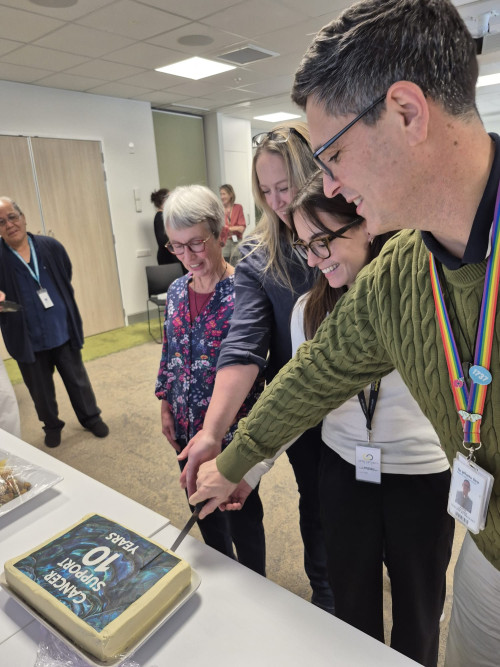

The Cancer Psychological & Social Support Services (CPSSS), which assists people with a cancer diagnosis and helps achieve our ‘faster cancer treatment’ health target by improving access to treatment, is celebrating 10 years of being established.
The CPSSS, a national programme that’s implemented locally in each district, is holding functions to mark the occasion around the country this month. Our CPSSS Capital, Coast and Hutt Valley team celebrated with a function yesterday in the Te Wao Nui, Wellington Children’s Hospital.
“I’ve been involved with the service from the beginning and I’m really proud of what we’ve achieved, so it was great to mark our 10-year anniversary today,” CPSSS Regional Lead for Capital, Coast, Hutt Valley and Wairarapa, Justin Gulliver, says.
“Our aim is to help reduce the psychological and social impact of a cancer diagnosis on people and their whānau. We also improve access to treatment for people at risk of poorer outcomes due to social, cultural, economic and emotional barriers which can affect their ability to engage with cancer services, aligning with our ‘faster cancer treatment’ target. One of the most heartening things is that we’ve legitimised psycho-social oncology within the medical system and it’s its own thing now.”
“Psychological distress is very common among cancer patients because the disease impacts on every part of their life – physical, emotional and social,” Justin says. “Going through the treatment can be overwhelming and some people don’t have a lot of support, which can lead to disengagement from care and treatment.
“Our social workers and psychologists assist cancer patients to make sense of what’s going on, understand and follow their treatment plan, get to appointments and figure out what support they need, as well as face uncertainty and possibly even dying. We also have an educational role – upskilling clinical staff on how to provide basic levels of support to people who are upset or distressed – because supportive care is everyone’s role.”
The number of staff in the CPSSS has grown across the country over the last decade with a network of support services and a clinical lead in each region – all working together to ensure people receive the right care at the right time, no matter where they’re located. Prior to the CPSSS, Capital, Coast and Hutt Valley had only two social workers and no psychologists. This has grown to seven social workers and four psychologists.
“I love what I do and the team I work with are fantastic. We all feel privileged to work with people who are facing such tough times,’ Justin says. “We can’t cure them, but we can enhance their quality of life and help them through what’s usually a really difficult time.”
The national leadership team aims to release a 10-year report detailing the service’s goals and vision for the future later this year.